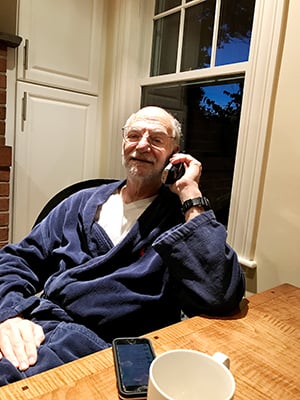Michael Rosbash
Interview
Interview, December 2017
Interview with Medicine Laureate Michael Rosbash on 6 December 2017 during the Nobel Week in Stockholm, Sweden.
Michael Rosbash answers the following questions (the links below lead to clip on YouTube):
0:00 – What was the moment you decided to pursue science?
1:03 – What effect did your upbringing have on you?
2:13 – Are you more of a morning person or a night owl?
2:39 – Do you remember first meeting Jeffrey Hall?
3:57 – How did you and Jeffrey Hall complement one another?
4:54 – What drove you from competition to collaboration in your field?
6:26 – Can we control the biological clock, possibly prolonging human life?
8:19 – What are your tips for handling jet lag?
8:56 – Is our circadian rhythm like a sixth sense?
10:29 – Is it important to have a mentor?
13:33 – What’s your advice for young people?
15:33 – Where do you do your best thinking?
16:29 – How has your family supported your work?
17:20 – How do you spend your free time?
18:39 – What sports learnings also apply in science?
19:42 – What research are you pursuing right now?
21:06 – How has your research benefitted humankind?
Nobel Minds 2017
The 2017 Nobel Laureates met at the Grünewald Hall in the Stockholm Concert Hall in Stockholm for the traditional round-table discussion and TV program ‘Nobel Minds’. The discussion was hosted by the BBC’s Zeinab Badawi.
Telephone interview, October 2017
“My wife said, ‘Start breathing'”
Telephone interview with Michael Rosbash following the announcement of the 2017 Nobel Prize in Physiology or Medicine, 2 October 2017. The interviewer is Adam Smith, Chief Scientific Officer of Nobel Media. Michael Rosbash describes the moment he found out he had been awarded the 2017 Nobel Prize in Physiology or Medicine.
Interview transcript
[Michael Rosbash]: Hello
[Adam Smith]: Hello may I speak to Michael Rosbash please?
MR: You’re speaking to him.
AS: Thank you very much. My name is Adam Smith calling from Nobelprize.org, the website of the Nobel Prize. So I suppose it’s funny in a way that a prize for working out the molecular mechanisms of the circadian rhythms is announced in a way that disrupts your own sleep cycle.
MR: Indeed. [Laughs] Ironic, yes. I hadn’t thought about that, I must confess, but absolutely, yes.
AS: How did you hear the news?
MR: The phone on the night table by my bed woke me out of a deep sleep. And the gentleman Thomas Perlmann, yes, he told me the news. And I was shocked, breathless really. Literally. My wife said, “Start breathing.”
AS: In a way this is something that everyone takes for granted, their adaptation to night and day. But it’s sort of the original adaptation to environmental influence, isn’t it?
MR: It is, it is. Before the atmosphere has its current constitution and before nutrition was anything like it is today, the earth rotated on its axis and the light dark cycle impinged on the beginnings of life, yes.
AS: And I suppose it’s hard for people to imagine how different it was 30 years ago when you were starting this work, that you were real pioneers in linking genes to behaviour.
MR: Right, it’s true, it’s true. We didn’t think of ourselves as that, you know everybody … There’s an element of craft in the work, you know, we’re putting one foot in front of the other. Trying to get more experiments to work than fail but in hindsight, yes, there’s some truth in that.
AS: And the prize is also a celebration, I suppose, of your close working relationship with Jeffrey Hall.
MR: It is, it is. Yes. Long, long, long partnership.
AS: What made you such a strong team?
MR: We were very, we had very … Two things, we were very good friends personally, before in fact we started to work together. And secondly we had complimentary skillsets.
AS: I gather he’s a bit of a maverick, riding Harley-Davidsons and the like.
MR: That sort of thing yes. And the like. Yes, that’s a good way to put it. Very British and very appropriate.
AS: Will we look forward to welcoming you to Stockholm in December?
MR: Of course you will.
AS: Great, well enjoy your day and thank you for speaking to us.
MR: Thank you very much.
AS: Thank you.
MR: Bye bye.

Michael Rosbash receiving the telephone call in his kitchen in Newton, MA.
Did you find any typos in this text? We would appreciate your assistance in identifying any errors and to let us know. Thank you for taking the time to report the errors by sending us an e-mail.
Nobel Prizes and laureates
Six prizes were awarded for achievements that have conferred the greatest benefit to humankind. The 14 laureates' work and discoveries range from quantum tunnelling to promoting democratic rights.
See them all presented here.
